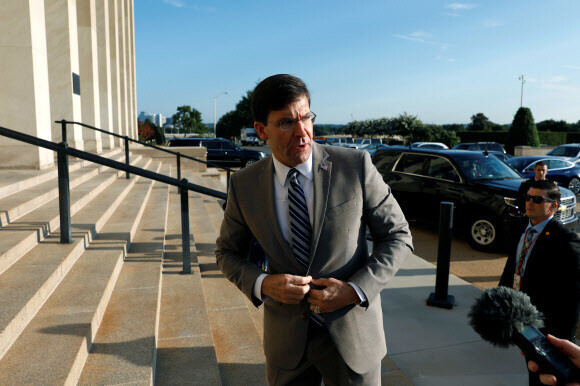hankyoreh
Links to other country sites 다른 나라 사이트 링크
US defense secretary says US will review redeployment of US troops in Indo-Pacific Command

US Secretary of Defense Mark Esper said that the US would be reviewing a redeployment of American troops in the Indo-Pacific Command over the next few months. US Forces Korea (USFK) is part of that command.
Esper reviewed the major tasks of his first year as Defense Secretary in a document titled “NDS Implementation: First Year Accomplishments,” which was released on July 17. NDS stands for the National Defense Strategy.
As part of his reforms, Esper said the US will “reallocate, reassign, and redeploy forces in accordance with the NDS.”
“Each Combatant Command is going through a clean-sheet review to consolidate and reduce legacy missions, tasks, and posture, in order to optimize our operational footprint,” the secretary said.
After noting that “ongoing reviews and adjustments” are already taking place in the US’ Africa Command, Southern Command, Strategic Command, Central Command, European Command, Cyber Command, and Space Command, Esper said that the US “will also begin reviews” of Transportation Command, Indo-Pacific Command, and Northern Command “in the coming months.”
The US has already said it intends to consider redeployment of troops in its Indo-Pacific Command. In security and defense strategy documents published in 2017 and in January 2019, the US placed the highest priority on containing China and emphasized that the Indo-Pacific region is critical to that effort. The US government and Congress are both pushing to strengthen US military assets in that region.
But Esper’s remarks are especially notable considering that they coincide with a Wall Street Journal article published on the same day. Quoting US government officials, the Journal said the Pentagon, which Esper leads, had submitted a report to the White House in March about redeploying American troops stationed overseas, including the option of a troop reduction in South Korea.
Since the Trump administration is pushing to strengthen its military posture in the Indo-Pacific to contain China, there would logically seem to be little chance of USFK being downsized. Even so, diplomatic sources say that South Korea should keep an eye on Trump’s decisions, considering that one of his campaign promises was bringing US troops home from overseas, something he has actually done in Afghanistan and Germany. Trump might also use the prospect of a USFK reduction to push Seoul to agree to a substantial increase in its cost-sharing contribution.
There’s also staunch opposition in the US Congress to a USFK troop reduction. “This kind of strategic incompetence is Jimmy Carter-level weak,” said US Senator Ben Sasse, a Republican, in a statement on July 17, in a reference to the former president’s attempt to pull US troops out of Korea.
“We don’t have missile systems in South Korea as a welfare program; we have troops and munitions there to protect Americans. Our aim is to give the Chinese communist leadership and the nuclear nut tyrannizing his North Korean subjects something to think about before they mess with us,” Sasse said.
Congressman Adam Smith, chairman of the House Armed Services Committee, reconfirmed his opposition to a USFK reduction in a video seminar held on the same day by the New Democrat Network. Smith said in the seminar that USFK is providing adequate deterrence against North Korean aggression.
An official at the Pentagon responded to media inquiries about the Wall Street Journal report by noting that the US regularly reviews its global defense posture and that the US army is ready to respond to any threat.
By Hwang Joon-bum, Washington correspondent
Please direct comments or questions to [english@hani.co.kr]

Editorial・opinion
![[Editorial] Penalties for airing allegations against Korea’s first lady endanger free press [Editorial] Penalties for airing allegations against Korea’s first lady endanger free press](https://flexible.img.hani.co.kr/flexible/normal/500/300/imgdb/original/2024/0502/1817146398095106.jpg) [Editorial] Penalties for airing allegations against Korea’s first lady endanger free press
[Editorial] Penalties for airing allegations against Korea’s first lady endanger free press![[Editorial] Yoon must halt procurement of SM-3 interceptor missiles [Editorial] Yoon must halt procurement of SM-3 interceptor missiles](https://flexible.img.hani.co.kr/flexible/normal/500/300/imgdb/child/2024/0501/17145495551605_1717145495195344.jpg) [Editorial] Yoon must halt procurement of SM-3 interceptor missiles
[Editorial] Yoon must halt procurement of SM-3 interceptor missiles- [Guest essay] Maybe Korea’s rapid population decline is an opportunity, not a crisis
- [Column] Can Yoon steer diplomacy with Russia, China back on track?
- [Column] Season 2 of special prosecutor probe may be coming to Korea soon
- [Column] Park Geun-hye déjà vu in Yoon Suk-yeol
- [Editorial] New weight of N. Korea’s nuclear threats makes dialogue all the more urgent
- [Guest essay] The real reason Korea’s new right wants to dub Rhee a founding father
- [Column] ‘Choson’: Is it time we start referring to N. Korea in its own terms?
- [Editorial] Japan’s rewriting of history with Korea has gone too far
Most viewed articles
- 1Months and months of overdue wages are pushing migrant workers in Korea into debt
- 2Bills for Itaewon crush inquiry, special counsel probe into Marine’s death pass National Assembly
- 31 in 3 S. Korean security experts support nuclear armament, CSIS finds
- 4Trump asks why US would defend Korea, hints at hiking Seoul’s defense cost burden
- 5[Reporter’s notebook] In Min’s world, she’s the artist — and NewJeans is her art
- 6S. Korea discusses participation in defense development with AUKUS alliance
- 760% of young Koreans see no need to have kids after marriage
- 8[Editorial] Penalties for airing allegations against Korea’s first lady endanger free press
- 9[Column] Can Yoon steer diplomacy with Russia, China back on track?
- 10Vietnamese war victims speak of sexual violence by S. Korean troops for the first time